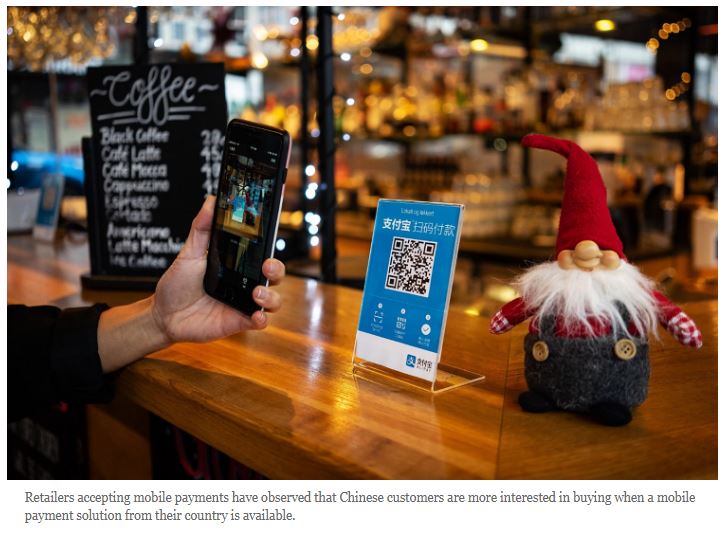Thailand: No cash, no problem
The relentless rise of Chinese tourists has been one of the biggest stories shaping the global travel industry. In the next three years, outbound trips from China are predicted to reach 178.4 million, while annual expenditure will hit approximately 5.5 trillion baht.
Thailand too has felt the positive impact. In August 2019, Chinese tourist arrivals rose 19% year-on-year to 1.03 million, the first time the figure had topped 1 million after a six-month slowdown. The amount they spent on hotels, entertainment, shopping and dining in Thailand grew 20% to 54.9 billion baht.
It’s no surprise that businesses are looking to expand their services and offerings to cater to the spending preferences and behaviours of Chinese travellers. Alipay, the Chinese mobile and online payment platform, has identified four ways for businesses to capitalise on the opportunity.
Transforming the retail experience: Many retailers are starting to create bespoke shopping experiences that cater specifically to the needs of wealthier Chinese tourists. Some are also learning more about what Chinese tourists want while addressing their sensitivities, customs and habits.
For instance, 35% of Chinese tourists prefer to buy from well-known brands, and 62% will purchase products that they cannot find back home, according to a survey by McKinsey & Company. Recognising these spending patterns will help businesses align their marketing and promotion efforts.
Embracing mobile payments: With mobile becoming their primary payment method back home, Chinese travellers have integrated this change into their travel habits as well, embracing e-wallets when they travel outside of China. Last year, 32% of Chinese tourists made payments with their mobile devices, rising from 28% a year earlier, and for the first time overtaking cash, which accounted for 30% of payments.
Retailers that have started accepting mobile payments have observed that Chinese customers are more interested in buying when a mobile payment solution from their country is available. For example, Nielsen found that over 93% of Chinese tourists would be more willing to make purchases with their mobile phones and would even increase their spending if the option were available.
Brick-and-mortar retailers have all begun to go digital with mobile transactions increasingly available at the likes of night markets, car rentals, food courts and more.
The experience goes beyond just pure payments. In Thailand, 17 hotels under Marriott International and 14 under Minor Group have teamed up with Alipay to provide “hotel pre-authorisation” for Chinese tourists to secure funds for hotel fees and enhance the travel experience.
The app temporarily holds an amount from the customer’s account during their stay, which is immediately released into their wallet again upon check-out. Given their familiarity with e-wallets back home, impressing Chinese visitors with innovative services and efficient technology when they travel can give a hotel a competitive advantage.
In-app digital marketing: As Chinese mobile wallet apps follow their customers around the world, Thai retailers should pay attention to the marketing capabilities built into these apps.
Airlines, for example, are actively creating and using official accounts on Alipay and other mobile apps to increase the number of direct bookings on their websites. Fashion brands and department stores create vivid and attractive profiles with presentations of new collections, fashion looks and special deals.
Likewise, hotels, museums and other places of interest can offer local guides with must-see sights with posts inside their lifestyle app accounts. Cafes and restaurants can even integrate menus in Chinese into their profiles.
Furthermore, posts in these channels can be easily targeted, and a wide range of in-app advertising options are available for all budgets. For example an Alipay service called StoreFront allows offline stores to promote their merchandise and best offers as well as share localised content.
Riding the “silver-haired” wave: About a fifth of Chinese travellers are senior citizens, and travel at least four times a year, both domestically and internationally, according to a researcher from Guilin Tourism University.
With accumulated wealth and more free time, retired Chinese tourists can plan their holidays outside of busy periods, allowing for cheaper air fares but longer trips. Malaysia, Thailand and Japan are among their favourite overseas destinations.
Many of these senior tourists have also begun embracing mobile payments. A Nielsen survey highlights that last year, 88% of older Chinese travellers prompted merchants for mobile payment options while abroad, a 14% increase from the previous year.
With outbound trips from Mainland China estimated to reach 260 million by 2030, the scale and potential opportunity presented by Chinese travellers is going to be phenomenal. It is therefore important for Thai businesses to take the time to really understand the behaviours and preferences of Chinese travellers and invest in the right technology and platforms to offer the same seamlessness in their transactions as they experience back home.
By doing so, not only can Thai businesses tap into the Chinese tourist opportunity, they will also start moving towards becoming digital lifestyle providers for all customers, from Thailand and elsewhere around the world.
Cherry Huang is the general manager for cross-border business in Southeast Asia with Alipay.
Source: https://www.bangkokpost.com/business/1794859/no-cash-no-problem


 English
English




